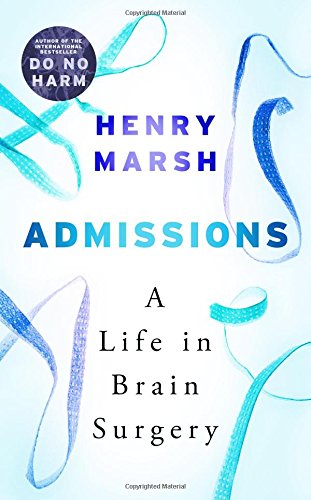Sunday Book: Henry Marsh - Admissions: A Life in Brain Surgery | reviews, news & interviews
Sunday Book: Henry Marsh - Admissions: A Life in Brain Surgery
Sunday Book: Henry Marsh - Admissions: A Life in Brain Surgery
Highly personal, hugely relevant second memoir from the 'Do No Harm' neurosurgeon

Is it true that the blob of jelly resembling convoluted grey matter that we carry around in our skulls is really what we are? And how we are, and why? This is the profound question that is obliquely omnipresent in Henry Marsh’s second book on his life as a neurosurgeon as he describes his encounters with this physical part of us that seems to be, well, us.
Doctors, of course, have a long history of writing – think Keats, Chekhov, Arthur Conan Doyle, William Carlos Williams – and have now emerged writing about their own trades. Memoirs have recently become the purview of patients, and there has been a spate of revelatory, moving and compelling narratives, several from journalists and emerging from newspaper columns – John Diamond, Tom Lubbock, Marion Coutts. Now doctors writing about their own profession is big in America, perhaps initiated by the long articles under the rubric “Annals of Medicine” which are occasional and significant features in The New Yorker, before emerging as fully-fledged books, even influencing the course of medical training and practice. (Atul Gawande is a case in point: his Complications and Being Mortal are titles that speak for themselves.)
Startlingly he reveals that he has long kept a suicide kit at home
Henry Marsh entered the field in 2014 with his own history, Do No Harm, its chapters titled by the names of the conditions on which he was operating. His descriptions of individual patients, their cases, the teams with whom he worked, the responses of all around him, and his own attitudes and feelings were mesmerising – and curiously informative.
He combined descriptions of his encounters with patients with specific conditions – and outcomes that ranged from triumphant to tragic – with a subtle history of the recent years of neurosurgery, as doctors moved from the wholly manual to engagement with computers and robots. His character appeared a fascinating combination of arrogance and self-deprecation, confident yet profoundly questioning. It was as much about the recent history of medicine in his field as about himself. But his biography was oblique.
Now having left the NHS, his new book, Admissions A Life in Brain Surgery, is more overtly autobiographical; it has also expanded its range geographically as Marsh goes on assignments to work in under-resourced countries like Nepal and Ukraine. Rather startlingly he reveals at the opening that he has long kept a suicide kit at home (although the medications may be well out of date). His description of his retirement from full-time NHS practice comes alongside a review of his decades as a surgeon; a candid description of his volatile childhood, and his breakdown as a student which led on to his discovery of medicine in general, and surgery in particular; and his coming to terms in some ways with the advent of old age (although he is still only in his late 60s).
 These are all themes that underlie a varied range of memories: descriptions of specific trips abroad as a neurosurgeon; the finding, purchase and renovation of a derelict lock-keeper’s cottage on a canal in Oxford; the bitter chords still reverberating from the dissolution of his first marriage; his self-perceived failures as husband and father; and the happiness of his second marriage. Thus the narrative is an unusually candid journey of self-discovery, intertwined with broader themes about the role of the medical profession.
These are all themes that underlie a varied range of memories: descriptions of specific trips abroad as a neurosurgeon; the finding, purchase and renovation of a derelict lock-keeper’s cottage on a canal in Oxford; the bitter chords still reverberating from the dissolution of his first marriage; his self-perceived failures as husband and father; and the happiness of his second marriage. Thus the narrative is an unusually candid journey of self-discovery, intertwined with broader themes about the role of the medical profession.
But these essays transcend his frank, even at times savage account of his own personality and character, as he describes in vivid prose his own personal achievements and disasters, and episodes in between, to reach for something more universal. He is quietly and pertinently almost transcendent with rage about what is happening to health systems around the world: commercialisation, competition, so-called market forces, corruption. There is a quietly terrifying chapter on visiting the Houston Medical Center, with its skyscraper hospitals on a vast site, and his criticisms of the “notorious extravagance” of the American system ring all too true. He is particularly distressed by what he regards as unnecessary procedures.
Medicine is here clearly presented as always the weighing of probabilities, summed up in his pithy quotation from Sir William Osler, “Medicine is a science of uncertainty, and an art of probability…” As well as admitting to his ignorance of the cultures and languages, he is distressed by the corruption and political mayhem of Ukraine and Mao-ist Nepal (where he unreservedly admires the great neurosurgeon Dev, with whom he had trained 30 years earlier, and who now has a private hospital in Kathmandu). He is outraged at the paucity of national medical services in such countries, but profound anger is reserved for what he sees as the political and managerial interferences in the NHS. This does not come across in any way as old fogey-ism, or anti-progress, but is rather an indictment of the perils of submitting to a medically ignorant bureaucracy in order to secure funding. Incident after incident, some of which he did not handle well, punctuate his narrative.
This is an enthralling book, unputdownable, although I would not have minded remaining a bit more ignorant of what may go wrong with that blob of jelly on which I depend. Admissions is a triple-edged title: the admission of patients, admission of unavoidable culpability and mistakes, and admission of the wonders of his field. It is highly personal and hugely relevant, and should be required reading for hospital managers, drug company executives and politicians. For the rest of us, it is an exhilarating, even thrilling read, a glimpse into a world we hope we may never have to enter. But if we do we will now be much better informed.
- Admissions: A Life in Brain Surgery by Henry Marsh (Weidenfeld & Nicolson, £16.99 hardback, £8.99 e-book)
- More book reviews on theartsdesk
The future of Arts Journalism
You can stop theartsdesk.com closing!
We urgently need financing to survive. Our fundraising drive has thus far raised £49,000 but we need to reach £100,000 or we will be forced to close. Please contribute here: https://gofund.me/c3f6033d
And if you can forward this information to anyone who might assist, we’d be grateful.

Subscribe to theartsdesk.com
Thank you for continuing to read our work on theartsdesk.com. For unlimited access to every article in its entirety, including our archive of more than 15,000 pieces, we're asking for £5 per month or £40 per year. We feel it's a very good deal, and hope you do too.
To take a subscription now simply click here.
And if you're looking for that extra gift for a friend or family member, why not treat them to a theartsdesk.com gift subscription?
more Books
 'We are bowled over!' Thank you for your messages of love and support
Much-appreciated words of commendation from readers and the cultural community
'We are bowled over!' Thank you for your messages of love and support
Much-appreciated words of commendation from readers and the cultural community
 Justin Lewis: Into the Groove review - fun and fact-filled trip through Eighties pop
Month by month journey through a decade gives insights into ordinary people’s lives
Justin Lewis: Into the Groove review - fun and fact-filled trip through Eighties pop
Month by month journey through a decade gives insights into ordinary people’s lives
 Joanna Pocock: Greyhound review - on the road again
A writer retraces her steps to furrow a deeper path through modern America
Joanna Pocock: Greyhound review - on the road again
A writer retraces her steps to furrow a deeper path through modern America
 Mark Hussey: Mrs Dalloway - Biography of a Novel review - echoes across crises
On the centenary of the work's publication an insightful book shows its prescience
Mark Hussey: Mrs Dalloway - Biography of a Novel review - echoes across crises
On the centenary of the work's publication an insightful book shows its prescience
 Frances Wilson: Electric Spark - The Enigma of Muriel Spark review - the matter of fact
Frances Wilson employs her full artistic power to keep pace with Spark’s fantastic and fugitive life
Frances Wilson: Electric Spark - The Enigma of Muriel Spark review - the matter of fact
Frances Wilson employs her full artistic power to keep pace with Spark’s fantastic and fugitive life
 Elizabeth Alker: Everything We Do is Music review - Prokofiev goes pop
A compelling journey into a surprising musical kinship
Elizabeth Alker: Everything We Do is Music review - Prokofiev goes pop
A compelling journey into a surprising musical kinship
 Natalia Ginzburg: The City and the House review - a dying art
Dick Davis renders this analogue love-letter in polyphonic English
Natalia Ginzburg: The City and the House review - a dying art
Dick Davis renders this analogue love-letter in polyphonic English
 Tom Raworth: Cancer review - truthfulness
A 'lost' book reconfirms Raworth’s legacy as one of the great lyric poets
Tom Raworth: Cancer review - truthfulness
A 'lost' book reconfirms Raworth’s legacy as one of the great lyric poets
 Ian Leslie: John and Paul - A Love Story in Songs review - help!
Ian Leslie loses himself in amateur psychology, and fatally misreads The Beatles
Ian Leslie: John and Paul - A Love Story in Songs review - help!
Ian Leslie loses himself in amateur psychology, and fatally misreads The Beatles
 Samuel Arbesman: The Magic of Code review - the spark ages
A wide-eyed take on our digital world can’t quite dispel the dangers
Samuel Arbesman: The Magic of Code review - the spark ages
A wide-eyed take on our digital world can’t quite dispel the dangers
 Zsuzsanna Gahse: Mountainish review - seeking refuge
Notes on danger and dialogue in the shadow of the Swiss Alps
Zsuzsanna Gahse: Mountainish review - seeking refuge
Notes on danger and dialogue in the shadow of the Swiss Alps
 Patrick McGilligan: Woody Allen - A Travesty of a Mockery of a Sham review - New York stories
Fair-minded Woody Allen biography covers all bases
Patrick McGilligan: Woody Allen - A Travesty of a Mockery of a Sham review - New York stories
Fair-minded Woody Allen biography covers all bases

Add comment